|
Organic
Chemistry Research Opportunities |
|
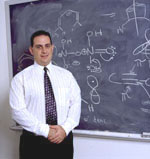
|
|
|
| This group
does "traditional organic synthesis." They don't have a homepage yet, but they
should soon.
Synthetic organic chemistry and methodology
development. Synthesis of bioactive natural products. Synthesis of
optically active biaryls for use in catalytic enantioselective synthesis.
|
|
|
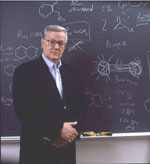 |
|
|
| Hydrocarbon
Chemistry- theoretically interesting molecules.
Chemistry of small ring systems; reactive
intermediates; synthetic methods; organo-transition metal chemistry,
chemistry of free metal atoms; fullerene chemistry.
|
|
|
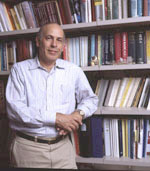
|
|
|
What you
would do: Short synthesis of an unnatural product,
something that is needed for mechanism studies. Alternately, you might do first
order kinetics on a compound that you or somebody else has made.
What you would learn:The
techniques used for kinetics are usually UV, NMR, or gas evolution. You can learn a
huge amount amount about laboratory technique, spectral interpretation, and operation of
analytical instruments. Publication is possible for students who work more than one
semester.
Organization: Supervised by a
postdoc, with periodic discussions with professor when you wish.
Suggested Experience: Elementary
organic chemistry is a must. Advanced orgo and Chem 352 are helpful. |
|
|
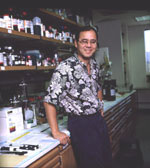
|
|
|
What you
would do: This lab is composed of
people from many different backgrounds, and does a very
broad range of research (ranging from evolution studies
to yeast genetics to bioengineering), and it is
consequently difficult to say anything specific about
what sort of projects new people might pursue in this
lab. Most undergraduate students work on cloning new
biosynthetic genes or generating mutants in known genes
to make enzymes with new functions.
Organization: Students
initially work closely with a graduate student, and then
become independent as they become more experienced.
Suggested experience:
I would rather take students as freshmen or sophomores,
and have them work with me
for several years than take more advanced students and
have them work for a semester or two. I do not
expect incoming students to have any specific courses or
lab experience, but they must be motivated and organized
so as to come up to speed quickly.
Note: This lab is
an appropriate place for people interested in graduate
school in the biological end of chemistry or the
chemical end of biology. We are not doing anything
directly medical, and premedical students would probably be better served by
finding research opportunities in the medical area. |
|
|
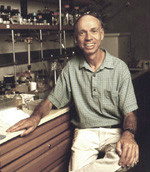
|
|
|
| This group is
concerned with the biosynthesis of natural products and the mechanisms of enzymatic
reactions. The current trend in these studies places an emphasis on the characterization
of interesting biosynthetic reactions at the enzymatic level and on the application of
molecular biology to the study of secondary metabolism.
|
|
|

|
|
|
What you
would do: Research efforts in this laboratory are divided
into two project areas: Probing molecular interactions during
DNA strand exchange mediated by the RecA protein of Escherichia coli and design of
modular proteins that mimic the properties of natural enzymes.
What you would learn: Strong
emphasis is placed on understanding what you are doing and why it is important.
Environment: Laid back,
and easy. Not too hard-core. The professor is motivating, although he is often
difficult to find. The other people do not push you to challenge yourself. You
typically work 10-20 hours/week.
Suggested Experience:Both
semesters of orgo (Chem 211 and 212). If interested in biochemistry, Bios 301and 302 are
recommended. |
|
|

|
|
|
|
Description: Organic
synthesis related to nanoscale science. Construction of molecular
computers, nanotrucks, etc.
Your Job in the Lab:
The
students are given a project along side a grad student or post doc to
work on.
Recommended experience:
The
students must have taken organic chemistry (CHEM 211-212) and have done
very well in the class.
Positions Open:
There are
currently 1-2 positions open for the summer and fall of 2000. |
|
|
|